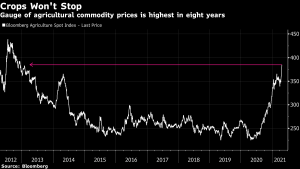A prolonged military conflict in the Middle East could potentially upend key commodity markets due to Iran’s control of the Strait of Hormuz, one of the world’s most important trade…
Renewable Diesel Demand Garners Attention Amid Soy Price Gains
Bloomberg writers Megan Durisin and Deirdre Hipwell reported on Friday that, “Corn, wheat, soybeans, vegetable oils: A small handful of commodities form the backbone of much of the world’s diet and they’re dramatically more expensive, flashing alarm signals for global shopping budgets.

“This week, the Bloomberg Agriculture Spot Index — which tracks key farm products — surged the most in almost nine years, driven by a rally in crop futures. With global food prices already at the highest since mid-2014, this latest jump is being closely watched because staple crops are a ubiquitous influence on grocery shelves — from bread and pizza dough to meat and even soda.”
The most recent crop spikes follow months of price gains fueled by booming import demand from China. Corn prices have doubled in the past year, while soybeans are up about 80% and wheat 30%. With China’s purchases continuing and a spate of adverse weather conditions threatening crops in Brazil and the U.S., there are few signs of respite.
With respect to other market implications of higher commodity prices, Reuters writer Ana Mano reported late last week that, “Large Brazilian meatpackers are turning to wheat as they try to fend off a rise in the cost of corn, the main livestock feed ingredient, meat lobby ABPA said.
“Francisco Turra, president of ABPA’s advisory body, told Reuters on Friday demand from meat processors, who provide feed to the farmers who raise the livestock, is driving a rise in wheat planting intentions in his native Rio Grande do Sul state.
“Wheat can replace 100% of corn as feed for pork and poultry, he said.”
The Reuters article pointed out that, “High prices and delays in Brazil’s second corn crop have pressured meatpackers’ margins, leading some companies to turn to Paraguay and Argentina for supplies.
“This week, the government waived import duties on soy and corn from nations outside the South American Mercosur trade bloc, meaning Brazil could import corn from nations like the United States and Ukraine.”
Business news articles have also highlighted recent market impacts of renewable diesel demand, and the stocks used to make the product, including soybean oil.
Last week, Bloomberg writer Breanna T Bradham reported that, “A soybean seed that can produce more oil than normal is in the works by one California startup, just in time to help meet accelerating demand for renewable diesel.
“ZeaKal has new data showing their soybeans can boost the protein and oil in seeds, without reducing yield.”
The Bloomberg article explained that, “The new data [from ZeaKal] comes amid a global thirst for vegetable oils, such as soybean oil and palm oil, to meet growing interest in renewable diesel and increased demand for grains, like corn and soybean meal, to feed China’s growing hog herd. Soybean’s most-active futures contracts in Chicago are up nearly 12% so far this year.”

And Reuters writer Stephanie Kelly reported last week that, “Cargill and Love’s Family of Companies announced Tuesday they have entered into a joint venture to produce and market renewable diesel in the United States.
“The companies will construct a new production plant in Hastings, Nebraska, that will produce about 80 million gallons annually of renewable diesel, a cleaner fuel which can be made from natural fats, vegetable oils and greases that can power vehicles with diesel engines.”
The Reuters article stated that,
A growing number of companies, including oil refiners, have announced investments in renewable diesel over the last year. Companies can earn credits from producing the fuel through state and federal clean fuel incentive programs.
A separate Reuters article late last week reported that, “Cargill Inc will build a $350-million canola plant in Regina, Saskatchewan, the U.S. agribusiness said on Thursday, in the latest project that aims to profit from booming demand for oilseeds.
“Canola futures hit record highs this week and soybeans have hit multi-year tops as demand for canola to process into vegetable oil and animal feed exceeds supply.
“Refiners are also planning to produce renewable diesel from canola and soybeans to comply with government mandates in Canada and several U.S. states to make cleaner-burning fuels.”
The article noted that, “‘There’s going to continue to be strong pull, we believe, into countries like China, from a food perspective,’ Jeff Vassart, President of Cargill’s Canadian unit, said in an interview. ‘We do see increasing demand for renewable diesel too and we want to make sure that we’re positioned for it.'”
Also last week, Reuters writer Stephanie Kelly reported that, “Strategic Biofuels LLC, a project development company, announced on Friday it plans to develop a renewable diesel plant in Louisiana that will produce up to 32 million gallons per year of renewable fuel using wood waste.”
“The development is one of many over the last year, as companies, including oil refiners, scramble to capture incentives for the production of renewable diesel,” the Reuters article said.
And Reuters writer Laura Sanicola reported on Thursday that, “Used cooking oil, a feedstock fueling America’s renewable diesel boom, is running in short supply, according to U.S. refiner Valero.”
The Reuters article pointed out that, “Renewable diesel has been tremendously profitable for Valero, an early mover that secured ample supply of advantaged feedstocks with low carbon intensity.
“Valero’s renewable diesel segment a record operating income in the segment of $203 million in the first quarter of 2021.”





